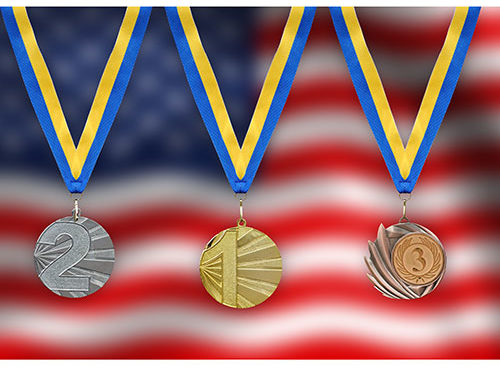How will the USA men stack up against Japan and China?
While most experts would agree that the battle for the men’s world team gold next month will be between Japan and China, the possibility for a surprise always exists in a three-up-three-count format. We’ve seen more than a couple of major upsets under these dramatic and unpredictable team rules, which were first instituted in 2001. Belarus was the surprise 2001 team world champions after finishing 8th at the Olympics the previous year. The Russians have been all over the team rankings in the past 10 years, going from Olympic gold in 2000 to 7th in 2001, and from silver in 2006 to 7th place again in 2007. Germany has climbed all the way from 13th and 12th in 2001 and 2003 up to a bronze medal in 2007. The 2003 world champion Chinese team headed to Athens in 2004 as the gold-medal favorites, but self-destructed in the Olympic team finals and ended up 5th. And then there’s the United States, who finished 13th as a team in 2006, 4th in 2007, and then overcame tremendous adversity to win a surprising Olympic bronze in 2008, one of its most inspirational finishes in Olympic history.
In the chart below, I’ve shown the top three scorers from our world team from the Visa Championships to get an idea of what kind of team total this team is capable of. I’ve adjusted for the “special bonus” that was awarded at the Visa Championships for very high D-scores as well as high E-scores in some instances. Next to these hypothetical team totals, I’ve compared them to the corresponding team totals for the U.S. at both the 2008 Olympics and 2007 world championships:
| Event | Top Three from Visa’s
(on world team) |
Scores
from Visa’s |
Team Total | Team Total
from 2008 |
Team Total
from 2007 |
| Floor | Legendre | 15.3 | 45.25 | 45.4 | 46.8 |
| Horton | 15.15 | ||||
| Cameron | 14.8 | ||||
| Pommel Horse | Cameron | 14.85 | 43.3 | 41.875 | 43.525 |
| Leyva | 14.35 | ||||
| Horton | 14.1 | ||||
| Rings | Wynn | 15.85 | 46.75 | 46.375 | 46.35 |
| Horton | 15.8 | ||||
| Cameron | 15.1 | ||||
| Vault | Legendre | 16.45 | 48.5 | 48.225 | 47.3 |
| Horton | 16.05 | ||||
| Brooks | 16.0 | ||||
| P-Bars | Leyva | 15.6 | 46.45 | 47.05 | 46.1 |
| Brooks | 15.5 | ||||
| Horton | 15.35 | ||||
| High Bar | Brooks | 15.5 | 45.75 | 46.925 | 42.2 |
| Leyva | 15.35 | ||||
| Horton | 14.9 | ||||
| Grand Team Total | 276.00 | 275.85 | 272.275 |
Pretty interesting to see how similar the team’s strengths and weaknesses are two years later, even with different gymnasts in the mix. Amazingly, the totals between now and 2008 are just 0.15 apart! As you can see, this team is very capable of matching or even surpassing the bronze medal U.S. team from Beijing, and that’s just using scores from Visa’s. In some instances – such as Jonathan Horton on high bar, we can still score higher.
Now let’s take a closer look at how the U.S. men stack up against Japan and China. The following chart compares the U.S. scores with Japan’s and China’s scores on each event from the 2008 Olympics. In parentheses I’ve shown how much further ahead (or behind) China and Japan were from the U.S., and bolded the most significant differences:
| Event | USA | China | Japan |
| Floor | 45.4 | 45.925
(+0.525) |
45.975
(+0.575) |
| Pommel Horse | 41.875 | 46.025
(+4.15) |
45.575
(+3.7) |
| Rings | 46.375 | 48.875
(+2.5) |
46.9
(+0.525) |
| Vault | 48.225 | 49.325
(+1.1) |
46.75
(-1.475) |
| P-Bars | 47.05 | 49.025
(+1.975) |
47.075
(+0.025) |
| High Bar | 46.925 | 46.95
(0.025) |
46.6
(-0.325) |
| Total | 275.85 | 286.125
(+10.275) |
278.875
(+3.025) |
Compared to China, we had four events that cost us a lot – pommel horse, p-bars, rings, and vault. But compared to Japan, it was really just pommel horse that kept us from beating them. We actually outscored them on vault and high bar, essentially tied them on p-bars, and were just a half point away on floor and rings.
So what does all this mean? To me it means that although China and Japan will likely be the favorites for gold at worlds next month, things could tighten up considerably between the top three teams because I believe both Japan and the U.S. have moved closer to China. The U.S. appears to be at least on a par with its team from Beijing, with China’s status a bit questionable and Japan’s status looking quite good. The U.S. will need Jonathan Horton to be on fire like he was in Beijing. They’ll need Danell Leyva to show the competitive confidence he did last month when he gave Horton a serious run for his money. They’ll need Steven Legendre to hit his world class floor routine and gutsy new vault when he has just one shot. They’ll need first-time world team members Chris Cameron, Brandon Wynn, and Chris Brooks to perform like they’ve done this all before. And they’ll need three guys who never though they’d compete for the U.S. in a team finals on pommel horse to hit the event under big-time pressure.
Is it about time for another upset?



Leave A Comment